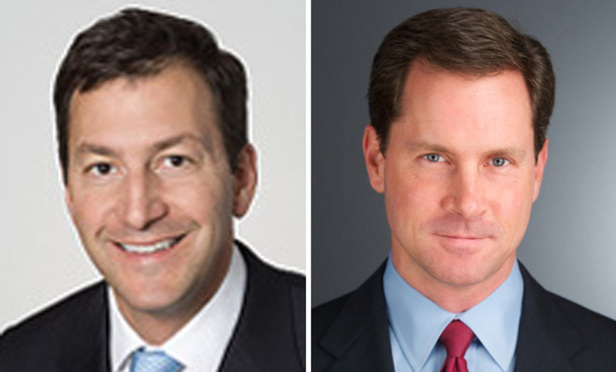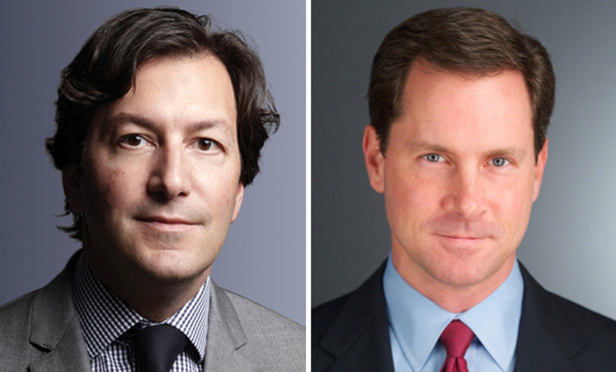Christopher Boehning

April 01, 2014 | New York Law Journal
Text Messages: Coming to a Litigation Near YouIn their Federal E-Discovery column, H. Christopher Boehning and Daniel J. Toal of Paul, Weiss, Rifkind, Wharton & Garrison write: Recent, high-profile matters confirm the emerging role of text messages in litigation.
By H. Christopher Boehning and Daniel J. Toal
9 minute read
March 17, 2014 | New York Law Journal
Managing the Five Stages of E-Discovery GriefH. Christopher Boehning and Ross M. Gotler of Paul, Weiss, Rifkind, Wharton & Garrison consider the Five Stages of Grief in the context of e-discovery and offer strategies for how companies can manage each of these Five Stages of E-Discovery Grief.
By H. Christopher Boehning and Ross M. Gotler
11 minute read

February 04, 2014 | New York Law Journal
'Seed Set' Documents Should Not Be DiscoverableIn their Federal E-Discovery column, H. Christopher Boehning and Daniel J. Toal of Paul, Weiss, Rifkind, Wharton & Garrison survey recent decisions concerning the use of predictive coding and explore the conflict over the extent to which the core processes of predictive coding are discoverable, including information about the "seed set" used to derive the relevant computer algorithm.
By H. Christopher Boehning and Daniel J. Toal
12 minute read
December 12, 2013 | New Jersey Law Journal
No Disclosure: Why Search Terms Are Worthy of Court's ProtectionJudges continue to order the disclosure of search terms that appear to discount or misunderstand the protected nature of key aspects of the e-discovery process.
By H. Christopher Boehning and Daniel J. Toal
9 minute read

December 03, 2013 | New York Law Journal
No Disclosure: Why Search Terms Are Worthy of Court's ProtectionIn their Federal E-Discovery column, H. Christopher Boehning and Daniel J. Toal of Paul, Weiss, Rifkind, Wharton & Garrison write: Judges have continued to order the disclosure of search terms in a series of decisions that appear to discount or misunderstand the protected nature of key aspects of the e-discovery process. A recent decision exemplifies this trend.
By H. Christopher Boehning and Daniel J. Toal
10 minute read

June 04, 2013 | New York Law Journal
Proposed Rule 37(e): A Step in the Right Direction?In their Federal E-Discovery column, H. Christopher Boehning and Daniel J. Toal, partners at Paul, Weiss, Rifkind, Wharton & Garrison, write that the revisions will moderate - if not eliminate - many of the concerns of litigants that lead to chronic over-preservation, that curative measures are favored, and that sanctions may not be imposed absent substantial prejudice to the adverse party.
By H. Christopher Boehning and Daniel J. Toal
13 minute read

February 05, 2013 | New York Law Journal
Third-Party Litigation Holds: 'Control' Can Be ComplicatedIn their Federal E-Discovery column, H. Christopher Boehning and Daniel J. Toal, partners at Paul, Weiss, Rifkind, Wharton & Garrison, write that control is easy to establish when a party to the litigation has possession or custody of the documents ascertain; when third parties possess documents that may be relevant to an action, however, determining whether there is "control" can be more complicated.
By H. Christopher Boehning and Daniel J. Toal
11 minute read

October 01, 2013 | New York Law Journal
'Sekisui' Shakes Up Sanctions Analysis for Evidence SpoliationIn their Federal E-Discovery column, H. Christopher Boehning and Daniel J. Toal of Paul, Weiss, Rifkind, Wharton & Garrison write: There is an encouraging trend of courts determining the propriety of sanctions for spoliation of electronically stored evidence with reference to the proposed amendment to Federal Rule of Civil Procedure 37(e). Judge Shira Scheindlin has recently weighed in on the future of sanctions for the destruction of evidence, however, and expressed serious reservations about the proposed changes to Rule 37(e).
By H. Christopher Boehning and Daniel J. Toal
13 minute read

December 06, 2011 | New York Law Journal
'Pippins' Order Highlights Preservation BurdensPaul, Weiss, Rifkind, Wharton & Garrison partners H. Christopher Boehning and Daniel J. Toal review the recent denial of KPMG's motion for a protective order to limit the scope of preservation of computer hard drives or to shift preservation costs to plaintiffs. Instead, Magistrate Judge James L. Cott of the Southern District required KPMG to "preserve the hard drives of thousands of former employees" who could fall within an as yet uncertified nationwide FLSA collective and/or a New York state class at a potential cost of millions of dollars to KPMG.
By H. Christopher Boehning and Daniel J. Toal
15 minute read

December 12, 2011 | Legaltech News
'Pippins v. KPMG' Order Highlights Preservation BurdensAttorneys H. Christopher Boehning and Daniel J. Toal review a case now awaiting a New York federal judge's opinion that could radically alter the scope of ESI preservation obligations.
By H. Christopher Boehning and Daniel J. Toal
15 minute read
Trending Stories
- 1Call for Nominations: Elite Trial Lawyers 2025
- 2Senate Judiciary Dems Release Report on Supreme Court Ethics
- 3Senate Confirms Last 2 of Biden's California Judicial Nominees
- 4Morrison & Foerster Doles Out Year-End and Special Bonuses, Raises Base Compensation for Associates
- 5Tom Girardi to Surrender to Federal Authorities on Jan. 7
More from ALM
- Scan In Progress: Litigators Leverage AI to Screen Prospective Jurors 1 minute read
- Legal Speak at General Counsel Conference East 2024: Match Group's Katie Dugan & Herrick's Carol Goodman 1 minute read
- Legal Speak at General Counsel Conference East 2024: Eric Wall, Executive VP, Syllo 1 minute read



